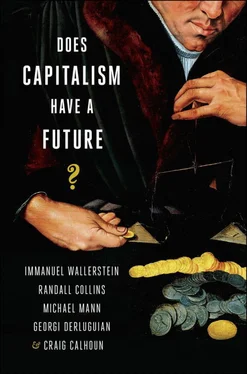Immanuel Wallerstein - Does Capitalism Have a Future?
Здесь есть возможность читать онлайн «Immanuel Wallerstein - Does Capitalism Have a Future?» весь текст электронной книги совершенно бесплатно (целиком полную версию без сокращений). В некоторых случаях можно слушать аудио, скачать через торрент в формате fb2 и присутствует краткое содержание. Город: New York, Год выпуска: 2013, ISBN: 2013, Издательство: Oxford University Press, Жанр: Публицистика, sci_economy, на английском языке. Описание произведения, (предисловие) а так же отзывы посетителей доступны на портале библиотеки ЛибКат.
- Название:Does Capitalism Have a Future?
- Автор:
- Издательство:Oxford University Press
- Жанр:
- Год:2013
- Город:New York
- ISBN:978-0-19-933084-3
- Рейтинг книги:5 / 5. Голосов: 1
-
Избранное:Добавить в избранное
- Отзывы:
-
Ваша оценка:
- 100
- 1
- 2
- 3
- 4
- 5
Does Capitalism Have a Future?: краткое содержание, описание и аннотация
Предлагаем к чтению аннотацию, описание, краткое содержание или предисловие (зависит от того, что написал сам автор книги «Does Capitalism Have a Future?»). Если вы не нашли необходимую информацию о книге — напишите в комментариях, мы постараемся отыскать её.
Does Capitalism Have a Future? — читать онлайн бесплатно полную книгу (весь текст) целиком
Ниже представлен текст книги, разбитый по страницам. Система сохранения места последней прочитанной страницы, позволяет с удобством читать онлайн бесплатно книгу «Does Capitalism Have a Future?», без необходимости каждый раз заново искать на чём Вы остановились. Поставьте закладку, и сможете в любой момент перейти на страницу, на которой закончили чтение.
Интервал:
Закладка:
The differences between the predictions (or future-approximations) of Mann on one hand and those of Collins and Wallerstein on the other correspond to the two sides of the dynamic model of human societies developed by evolutionary anthropologists. In technical terms, it is the “bearing capacity” of a human ecology versus its “productive intensification.” According to this model, all hitherto existent human societies tended eventually to fill their environments to saturation, or their bearing capacity. Such limiting crises left three dramatically different possibilities. The first was simply death. A recurrent catastrophe over the entire span of history has been a partial or even total extermination of human groups through famines, epidemics, and genocidal warfare. It is the tragic cycle of Malthusian demographic adjustments in the numbers of humans to be fed. The phases of declining population created conditions for resuming the productive activities on an unchanged basis until the environment was once again filled to bearing capacity, thus provoking another phase of hard times. The second possibility is diversification. It led our ancestors to the discovery and adaptive colonization of new geographic frontiers in the northern tundra and tropical islands, in the steppes, deserts, mountains, and forests—until the human race filled up the planet. Finally, the third possibility is what is usually called progress (i.e., qualitative intensification in the entire technological toolkit), enabling humans to gain ever more from their resources. The latter escape has been the main driving force of evolutionary innovation in human societies.
The complex class societies and first states rose in the productive locales that were too good to abandon, such as the fertile river valleys flanked by the deserts and mountains. The celebrated expression “caging effect” was in fact invented by Michael Mann in his earlier study of ancient empires, markets, and religions. [3] Michael Mann, The Sources of Social Power . Vol. I: A History of Power from the Beginning to A.D. 1760 . New York: (Cambridge University Press, 1986). Also see the synthesizing essay of Randall Collins “Market Dynamics as the Engine of Historical Change,” Sociological Theory 8 (1990): 111–35.
It means that moving away became impossible. Historically, such situations forced some human groups into the qualitatively new, more extensive and elaborate forms of social organization (i.e., new civilizations) that could increase the extraction and exchange of surpluses from the long-occupied locales. The verb “forced into” is intended to stress that many humans would rather not have become slaves, serf peasants, and tribute payers—but they were “caged” by the lack of escape and active coercion from the warrior and priestly elites. In the past, the intensification of productive techniques never came alone but in conjunction with major political and ideological reorganization. These transformative processes were always fraught with considerable conflicts.
In the present book, Michael Mann takes the position that capitalism remains resilient. Once again, Calhoun mostly agrees, though with greater stress on the ways capitalism must change to renew itself. Calhoun also stresses the difference between capitalism in general and the disproportionately financial capitalism that has lately exacerbated systemic risks. Capitalism, according to Mann, has virtually inexhaustible capacities for self-intensification through productive innovations as well as the globalization and deepening of consumer markets. If anything can ever finish capitalism, it will be an outbreak of warfare reaching its destructive limits in the nuclear age, or the planetary crisis of the natural environment. The former operates through causal chains largely independent of the dynamics of capitalism, and thus is contingent (i.e., unpredictable from the standpoint of an internal analysis of capitalism). In the main, this is what separates the positions of Mann and Calhoun from the projections advanced by Wallerstein and Collins. Environmental crisis, however, is one consequence of capitalist development, intersecting with political and cultural factors. Thus in a roundabout way, capitalism may generate its own downfall, even if, by virtue of intersecting causalities, it doesn’t have to be that way.
Randall Collins and Immanuel Wallerstein argue that capitalism is nearing its structural limits. Both acknowledge the extraordinary capacity of capitalism to expand and intensify its own political economy. Capitalism has created the first true world-system encompassing the entire planet with all its populations and productive resources. The displacement of agricultural and industrial jobs by machinery during the nineteenth century did not result in pauperization and revolution in the West, as predicted by Karl Marx in his age, because the development of modern managerial, professional and clerical occupations within private and government bureaucracies created a comfortable cushion of modern middle classes. Nevertheless, in the twenty-first century these spatial and internal reserves will finally be exhausted. If the model focusing on the effects of oligarchic overaccumulation and the distress of the middle classes has relevance across different historical epochs, the terminal crisis of capitalism would actually be a succession of various crises within a protracted period of decline.
Ultimately, however, we all agree that Michael Mann forces us to consider three imponderables: climate change, pandemics, and nuclear warfare. They are not imponderables in the dangers they pose for all of humanity. They are imponderables in terms of the timing of disasters. Our knowledge about each of these is extensive but there are enough uncertainties and differences of views among those who have studied these issues that we cannot be sure what exactly will happen. Climate change seems an unquestionable reality, except for those who reject this reality for political or ideological reasons. Furthermore, everything that has been causing climate change is actually accelerating rather than slowing down. The political differences between wealthier and poorer states as to what should be done about climate change make an accord that would mitigate the risks appear unattainable, at least for now.
However, the earth’s ecological complexity is so great, and these changes so extensive, that we do not know what kinds of readjustments will occur. It seems clear that water levels will rise and are already rising, and that this threatens the drowning of vast land areas. It also seems clear that the average temperatures in various parts of the world will change and are already changing. But this can result in shifting the location of agricultural production and energy sources to different zones in ways that might compensate for the acute damage to other zones.
The same thing seems to be true of pandemics. The enormous advances of world medicine in the last hundred or so years that have seemed to bring so many diseases under control have simultaneously created a situation in which humanity’s ancient enemy, the germ, has had to find new ways to be resistant. Once again, our knowledge seemed great but, when all is said and done, it turns out to be pitifully small. In this race against time, how fast will we learn? And how much must we unlearn in order to survive?
There remains the specter of extermination from nuclear weapons. Ever since the end of the Cold War and the hubristic attempt to impose an American unipolarity, nuclear proliferation has become virtually unavoidable. There might not be imminent danger in terms of interstate warfare. Indeed it is almost the contrary. Nuclear weapons are essentially defensive weapons and therefore reduce, not increase, the likelihood of interstate wars. Nevertheless, there remain several imponderables. The motivations of nonstate actors are not necessarily the same as those of responsible officials. No doubt there are some who would like to get their hands on nuclear weapons (as well as on chemical and biological weapons) and use them. The limited ability of many states to protect such weapons from seizure or purchase may facilitate their acquisition by nonstate actors. And the possibility of a rogue state agent, the Dr. Strangelove of fiction, is never to be ruled out.
Читать дальшеИнтервал:
Закладка:
Похожие книги на «Does Capitalism Have a Future?»
Представляем Вашему вниманию похожие книги на «Does Capitalism Have a Future?» списком для выбора. Мы отобрали схожую по названию и смыслу литературу в надежде предоставить читателям больше вариантов отыскать новые, интересные, ещё непрочитанные произведения.
Обсуждение, отзывы о книге «Does Capitalism Have a Future?» и просто собственные мнения читателей. Оставьте ваши комментарии, напишите, что Вы думаете о произведении, его смысле или главных героях. Укажите что конкретно понравилось, а что нет, и почему Вы так считаете.












